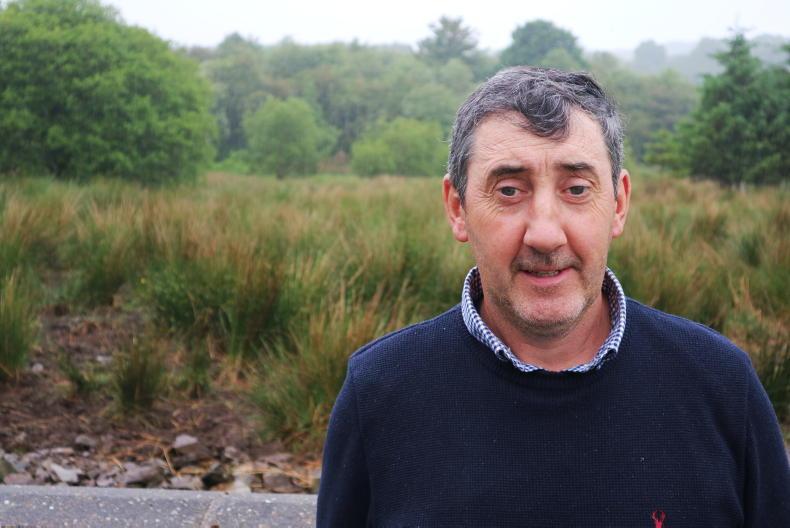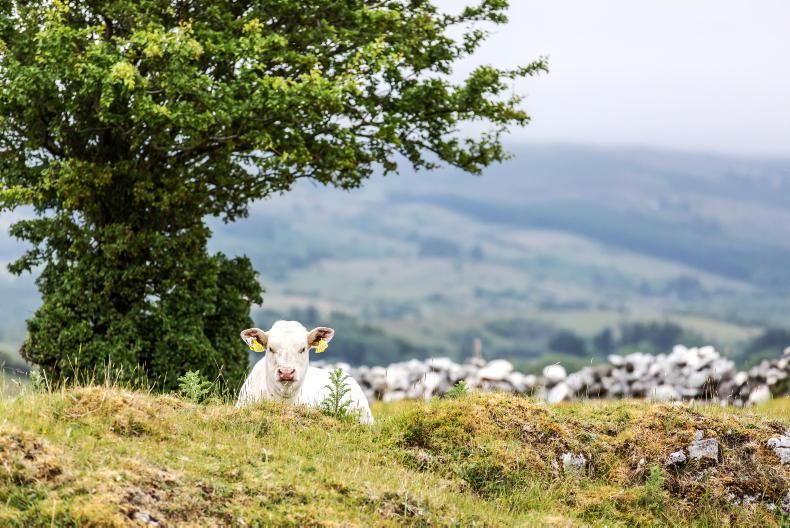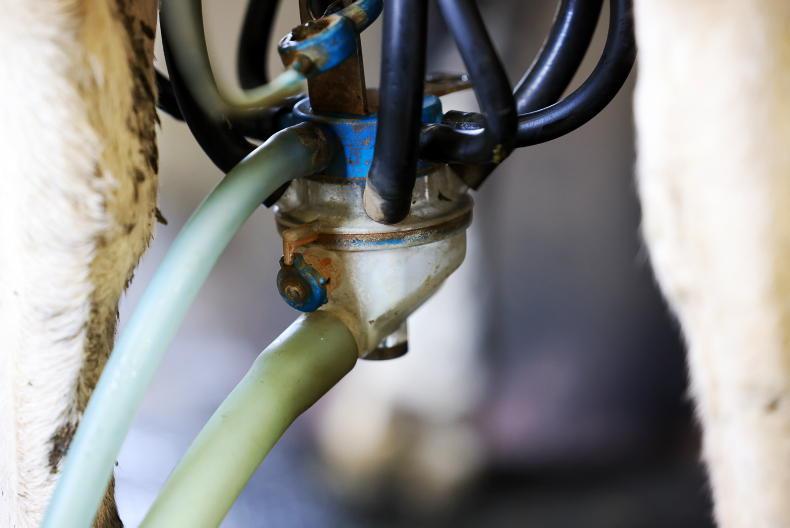Vincent Roddy,
INHFA president

INHFA president Vincent Roddy.\ Philip Doyle
Attempts to reduce the Pillar I funding for eco schemes was a “rearguard action” designed to frustrate convergence and limit CAP redistribution, the INHFA has claimed.
INHFA president Vincent Roddy urged the Minister for Agriculture Charlie McConalogue to “steadfastly defend” the 25% allocation for eco schemes which was outlined in the CAP Strategic Plan.
“It is obvious that farmers on higher payments see cutting eco scheme funding as a means of limiting CAP redistribution,” Roddy said.
However, the INHFA leader rejected suggestions that the eco scheme will cost farmers money. He pointed out that 60% of farmers, or 70,000 CAP applicants, will gain from the higher eco scheme allocation.
“The eco-scheme will pay out an average of €63/ha on all lands applied for, you don’t need entitlements to secure the payment,” he said.
The INHFA leader said reducing the share of Pillar I funding directed at eco-schemes would ultimately cost all farmers.
“They will still have to carry out two eco scheme measures anyway under the current EU regulations. But they will not be paid appropriately for their efforts to deliver these measures if the eco scheme funding is reduced,” Roddy explained.
He also cautioned that reducing eco scheme funding risked undermining efforts to secure adequate payments across all environmental programmes. “Sufficient funding needs to be put into all environmental schemes, both in Pillar I and Pillar II, if farmers are to be paid properly for their efforts in delivering the increased environmental ambition of the new CAP,” the INHFA leader said.
Similarly, Roddy supported the current proposals on CRISS, as an essential aid for small farmers. CRISS has been set at 10% of Pillar 1 payments. It will be paid out on the first 30ha, at a rate of about €44/ha.
“This CAP will see a vital redistribution of funds through convergence, CRISS and the eco scheme that will support and help ensure the viability of many smaller holdings.”
Padraic McGowan, sheep farmer, Leitrim
“I’m delighted with CRISS, it’s going in the right direction. It will be a great injection to marginal farmers in the west. We’re on less productive land here.
“In the past, all our calves went east and slaughter premiums were lost by the people who owned the cow. What this is doing is bringing about a reversal of fortunes for farmers in the east and south, we’re not going to shed tears.
“There’s a view out there that this money belongs to farmers, it’s taxpayers’ money.”
Micheál McDonnell, sheep farmer, Mayo
“Eco schemes are grand, once we have the correct actions and farmers aren’t excluded by the actions. They cannot be draconian. Farmers here won’t be getting GPS fertiliser spreaders. I’d be hoping the minister could add more options for farmers.
“On CRISS [front-loaded payments], over 80% of INHFA members said the CRISS model is one we should pursue. It’s going to benefit small holders. On convergence and entitlements, we cannot be basing our system on an age old model 20 years ago and many farmers with good entitlements changed enterprise. We’ve been curtailed for long enough, and I see convergence as very fair. It has been unjust for the last number of years.”
Seanie O’Baoill,
Donegal sheep farmer

Seanie O'Baoill.
“It’s only fair that smaller holdings get a bigger slice of the cake. On eco schemes, there’s a good chance farmers like myself will be able to qualify. There doesn’t seem to be anything there for Natura 2000 land. We keep being told it’s special but there doesn’t seem to be a payment or recognition of what we’re doing with that land. That should be one of the five eco schemes.
“Convergence is going in the right direction. Why is my hectare [for entitlements] different to any other? The fact that it’s based on farming 20 years ago doesn’t sit right with me. We should all be on the same hymn sheet.”
Geróid O’Connor, Sligo mixed farmer
“In my opinion, the guys who are farming should be getting the payments. There’s a lot of armchair farmers. To qualify for the BPS you had to be farming in the 2000s, I think that should be changed, especially for young farmers. Front-loading is going to suit a certain cohort of farmers. If you’re trying to derive an income from farming you should be looked after.”
Vincent Roddy,
INHFA president

INHFA president Vincent Roddy.\ Philip Doyle
Attempts to reduce the Pillar I funding for eco schemes was a “rearguard action” designed to frustrate convergence and limit CAP redistribution, the INHFA has claimed.
INHFA president Vincent Roddy urged the Minister for Agriculture Charlie McConalogue to “steadfastly defend” the 25% allocation for eco schemes which was outlined in the CAP Strategic Plan.
“It is obvious that farmers on higher payments see cutting eco scheme funding as a means of limiting CAP redistribution,” Roddy said.
However, the INHFA leader rejected suggestions that the eco scheme will cost farmers money. He pointed out that 60% of farmers, or 70,000 CAP applicants, will gain from the higher eco scheme allocation.
“The eco-scheme will pay out an average of €63/ha on all lands applied for, you don’t need entitlements to secure the payment,” he said.
The INHFA leader said reducing the share of Pillar I funding directed at eco-schemes would ultimately cost all farmers.
“They will still have to carry out two eco scheme measures anyway under the current EU regulations. But they will not be paid appropriately for their efforts to deliver these measures if the eco scheme funding is reduced,” Roddy explained.
He also cautioned that reducing eco scheme funding risked undermining efforts to secure adequate payments across all environmental programmes. “Sufficient funding needs to be put into all environmental schemes, both in Pillar I and Pillar II, if farmers are to be paid properly for their efforts in delivering the increased environmental ambition of the new CAP,” the INHFA leader said.
Similarly, Roddy supported the current proposals on CRISS, as an essential aid for small farmers. CRISS has been set at 10% of Pillar 1 payments. It will be paid out on the first 30ha, at a rate of about €44/ha.
“This CAP will see a vital redistribution of funds through convergence, CRISS and the eco scheme that will support and help ensure the viability of many smaller holdings.”
Padraic McGowan, sheep farmer, Leitrim
“I’m delighted with CRISS, it’s going in the right direction. It will be a great injection to marginal farmers in the west. We’re on less productive land here.
“In the past, all our calves went east and slaughter premiums were lost by the people who owned the cow. What this is doing is bringing about a reversal of fortunes for farmers in the east and south, we’re not going to shed tears.
“There’s a view out there that this money belongs to farmers, it’s taxpayers’ money.”
Micheál McDonnell, sheep farmer, Mayo
“Eco schemes are grand, once we have the correct actions and farmers aren’t excluded by the actions. They cannot be draconian. Farmers here won’t be getting GPS fertiliser spreaders. I’d be hoping the minister could add more options for farmers.
“On CRISS [front-loaded payments], over 80% of INHFA members said the CRISS model is one we should pursue. It’s going to benefit small holders. On convergence and entitlements, we cannot be basing our system on an age old model 20 years ago and many farmers with good entitlements changed enterprise. We’ve been curtailed for long enough, and I see convergence as very fair. It has been unjust for the last number of years.”
Seanie O’Baoill,
Donegal sheep farmer

Seanie O'Baoill.
“It’s only fair that smaller holdings get a bigger slice of the cake. On eco schemes, there’s a good chance farmers like myself will be able to qualify. There doesn’t seem to be anything there for Natura 2000 land. We keep being told it’s special but there doesn’t seem to be a payment or recognition of what we’re doing with that land. That should be one of the five eco schemes.
“Convergence is going in the right direction. Why is my hectare [for entitlements] different to any other? The fact that it’s based on farming 20 years ago doesn’t sit right with me. We should all be on the same hymn sheet.”
Geróid O’Connor, Sligo mixed farmer
“In my opinion, the guys who are farming should be getting the payments. There’s a lot of armchair farmers. To qualify for the BPS you had to be farming in the 2000s, I think that should be changed, especially for young farmers. Front-loading is going to suit a certain cohort of farmers. If you’re trying to derive an income from farming you should be looked after.”











SHARING OPTIONS